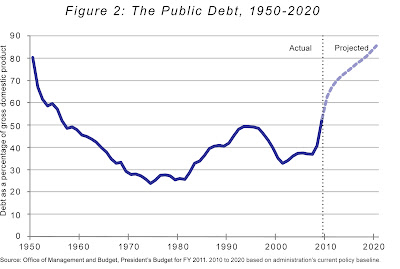###Current Cost of War in Iraq The little clock you see is from Zfacts, showing the current estimated cost of the war in Iraq based on congressional appropriations. My experience in that realm tells me that it is an undersestimate.
The current economic mess reminded me of an earlier time in my life when a drawn out war became a drain upon the U.S. Treasury and was financed with deficit spending. That time was Vietnam, and I was convinced then and remain so today, that the cost of that war directly resulted in the ruinous inflation of the 1970's. Coincidentally, that was also a time of fundamental shifts in world economic exchange arrangements. In 1971, the Bretton Woods system which had governed central bank exchanges after World War II, finally came undone due to the deficit spending of the U.S. government on social programs and the Vietnam war. Essentially, the policy of pegging the dollar to $35/ounce came undone and the reality of the dollar's falling value was recognized. Wikipedia article
here. However, floating the dollar against gold was a new experience for America's central bank, the Federal Reserve. As a result. they lacked knowledge of the tools needed to combat the ensuing inflation.
Fast forward to our decade. Nowadays, central banks purportedly understand the relationship between deficits and inflation. However, cost inflation was contained because of a new phenomenom, that did not escape the central bank's notice, but was seemingly beyond its power to influence. I am referring to the practice of consumers in China to save at high rates and for their bankers to invest those savings in American assets such as Treasury bonds or commercial bonds. Full article
here. This sopped up the extra liquidity in our system and hid the normal effects that would have resulted in price inflation. However, the inflation did show up in asset price inflation, primarily real estate. Meanwhile, both nations seemed to benefit. China strong export growth was fueling those savings and making the citizens feel more prosperous, even though the economy was not really producing benefits to consumers. The United States didn't have to deal with the tough choices that such high deficits would normally require.
The outgoing administration and the Republican party has much to answer for. Spending like drunken sailors on both the war and social programs reminds us of the Democrats of the LBJ era. But I also object to the cost of war. Yes, I supported the invasion of Iraq. However, our nation had a proven and successful blueprint for fighting overseas ground wars called the
Powell doctrine. Among its tenets was that war required overwhelming numerical superiority in order to prosecute to a quick conclusion. The doctrine also calls for a well planned exit strategy. Enter Donald Rumsfeld, a patriot, visionary, and a man who turned out to be too smart for the nation's good. I was on active duty when he was sworn in as Secretary of Defense and remember his vision pre-9/11 vision of a much smaller military with much greater emphasis on special forces. The war in Iraq gave him the chance to test that vision. But to my thinking, this was the wrong time to make such a gamble. The war in Iraq was always a gamble, in some ways a hail-mary to change the trend line in the middle east, to show the Muslim world that democracy and prosperity can coexist. To make a side bet on force structure under those circumstances seemed foolhardy to me. Ultimately a force leve was sent that could of course remove Saddam from power, but was insufficient to impose order on a post-Saddam Iraq. In hindsight, the widespread looting was a tipping point that showed the criminal and Islamofascist elements that we were not up to the job of pacifying the countryside. So here we are, over $600 billion later. Only the surge, which is a direct rebuke to Rumsfeld's arguments has saved the day. Ultimately, prolonging the war has had a direct cost to the national treasury that is calculable and has contributed to our current predicament.
Now we will be faced with tough times for many years to come. The war wasn't the only cause of increased deficits, but it hasn't helped. This kind of financial overhang is very difficult to unwind. It wasn't until 1982 that
inflation got under control in the United States. The current practice of adding more government debt to go along with all the private debt doesn't seem likely to help in the long run. Might as well bite the bullet now and start focusing on efforts that will encourage saving by U.S. citizens.
















